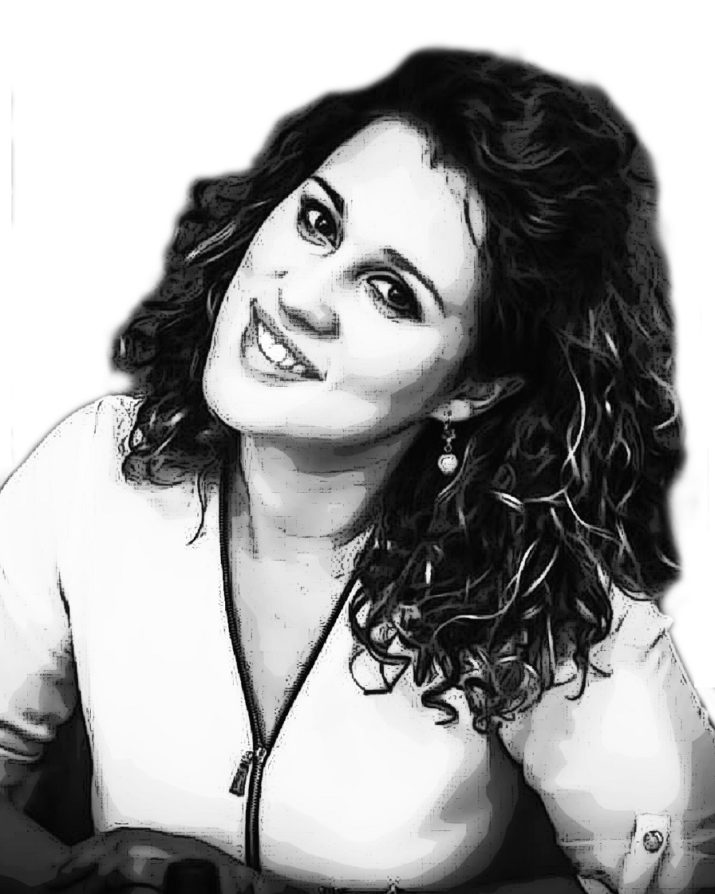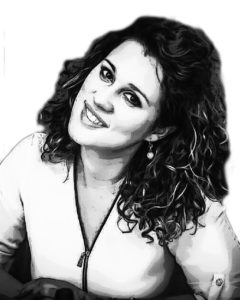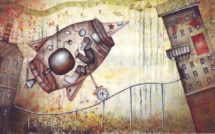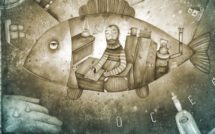

My cousin promised me a job in Austria. At the moment he told me he had managed to sort something out, I was glaring at a wall plastered with posters of nature, some of them faded and some coffeestained. The entire apartment was begrimed with the previous tenants’ addictions—from caffeine to domestic violence. I often imagined those people, all vehement and angry, hitting each other and spilling drinks on the carpet and creating art on the walls. One stain looked like a brown, coffeeish imprint of lips. My landlord was negligent, too, so he didn’t bother to repair anything, let alone paint.
The day my cousin contacted me, I had my semi-operational MP3 player on. Sylvia Plath’s voice reading “Daddy,” coming forth as if through cracks in the wood, suddenly went mute, and I saw the message on my phone: “I found you a job, call me ASAP.”
It was another jobless year in the life of a feningless, twenty-nine-year-old journalist who worked day and night at a local fast-food restaurant in downtown Sarajevo. I would have to leave my rented studio apartment soon if I let another rent bill go by unpaid. Actually, I was looking forward to leaving the apartment because the Tito-era windows were more foes than friends in the snowy winters. Yes … winters. Whenever I think of seasons, I can feel how a score of years has simply vanished in front of me, and I often contemplate how much I’ve missed and how much I am yet not to see. My face has always been pale: white, almost see-through. This is because, my dutiful heartbeat reminds me, I haven’t seen anything. A few years from now, my hair will also remind me that I am pale. White. See-through.
When I read my cousin’s message, I wanted to jump up and down on the couch, but instead I took my phone and opened Viber to call him. As I was trying to connect to the landlord’s poor internet, I noticed my hands and their swollen, light-blue veins. At least some color, I thought.
“Hey, you! Are you sure? I can’t believe it. Is this really happening?” I screamed with such excitement that the neighbor next door knocked on the wall. Finally, I could crawl out from under the rotten carpets and ruined hopes—here was my chance. I could stop trying to wash the smell of fried beef off my clothes. I could stop having to hear that fly buzz inside my head each time I contemplated a bright future. I could start over.
He said, “Yes, I’m sure. Look, what I found is—”
I interrupted Aldin before he managed to finish his sentence. “Doesn’t matter, jebote! You found me a job. I can leave this shithole! Yes, yes! I can never thank you enough, I—” When I calmed down, I heard him breathing on the phone. I said, “Hello? Are you there, Aldin?” This was after two milliseconds. I was impatient and too accustomed to disappointment. I had received rejection letters so many times, I’d come up with a system of self-deception to overwhelm the feeling. I read rejection as reception, and it helped me feel more physically present in this world.
“Look, I found you a job, but it’s not that simple. It’s just for a start, though—”
“Okay, please just tell me. Is it like you promised? I’ll first deliver papers and learn German simultaneously. After that I can get a promotion, right? This is what you said the last time we spoke.” Getting all this out in one breath was a wake-up call for my system of self-deception: Be ready to press PLAY.
“Before that you’ll have to do something else. But the pay won’t be slim, that I can promise you.”
“What, what, what?” I bit my lip twice.
“You’ll be a taxi driver. Like me.” The “taxi driver” didn’t hit me as much as the “like me” part did. I knew how much trouble Aldin endured to keep his job. He was bullied so often in his circles for being the ausländer that he’d contemplated suicide more frequently than he’d contemplated actually leaving the job. Wait, isn’t this what I wanted? To leave my country? To be an ausländer and to feel good about it? Was this deception too?
He continued, “What? What? It’s not fancy enough for your diploma?”
After a moment of silence, Aldin’s sarcasm made me feel as if my stomach had wrapped around itself in a knot. “Who the fuck said I wanted anything fancy? I wanted to deliver papers. That’s not fancy. Not at all. I’m just surprised. I—” Suddenly, I could hear him yelling at someone and cursing in Bosnian. He hung up and then called back. This time he sounded genuinely angry. And assholeish:
“You’re looking for a way out, but this is too humiliating for you, is that it? As far as I know, you’ve worked in a fast-food restaurant all these months. I suppose that’s one of the reasons why you’re single most of the time. You stink like hell. Ha ha.” This time I hung up.
Aldin was the brother I never had. Our wartime childhood had made him somewhat psychologically challenged, and he could never go for two hours together without expressing anger or aggression. He wasn’t dangerously aggressive—just enough that you didn’t want to know what he’d been through. Growing up in a war, we’d had to make our own reality. A world where a loaf of bread was a mountain of chocolate and where the explosion of grenades was a line from one of AC/DC’s greatest hits. My parents took care of Aldin because his had been murdered right at the beginning. We had a very close relationship, and the newcomers in our neighbourhood (there was a giant wave of refugees at the time) often thought we were twins. Not only did we look alike, but we also had similar voices. And we were both very pale. White. But not see-through. We had dreams.
After a few minutes, he called back.
I said, “You were over the line. You can’t talk to me like that, you hear me?” As I screamed at him, I felt my facial muscles tightening. I noticed that my jaw produced strange, cracking sounds every once in a while. I took a deep breath and tried to pull myself together.
Then Aldin said, “Look, do you want the job?”
“Yes, I want it. But I’m scared. I don’t know the town. Don’t know the streets. My German is poor.”
“This is the only option I’ve got so far. And there’s more.”
“Yes?”
“You’ll be me.”
This left me completely puzzled. “I’ll be what?”
“You’ll be me. You’ll drive the cab instead of me, and we’ll share the money. Fifty-fifty.”
“What do you mean I’ll drive it instead of you? You’ll sit at home and I’ll drive around and we’ll have an equal share? Why should I accept that?” At this point, my voice started to rise. I heard the fly buzzing again.
“You don’t have a choice if you want to come here right now, and there’s nothing to lose. You’ll spend some time on a tourist visa. Later we’ll figure something out.” He sounded confident. I wasn’t sure I wanted to hear what he would do in the meantime.
“What would you do?” I asked anyway, my voice sounding timid.
“I have a job opportunity with a couple of friends,” he said. “They’ve got connections and they’ve been offered a job and they want me in. But don’t ask me about that. Just tell me, are you interested in this?”
“Well, yeah. I guess, yes. Yes. I want it.” I said this while clenching my fists and looking at the posters on my walls. The hell with it. He’s right. I’ve basically got nothing to lose.
“And one more thing,” he said. “I won’t tell my boss that you’ll be working instead of me.”
“Why? But, but … people will notice. Your colleagues will notice. There aren’t many female taxi drivers, are there?”
“As I said, you’ll be me. You’ll dress like a man and wear a moustache and a hat every day to work. I’ll ask for a transfer to another post in town, to a post where nobody knows me. Otto, remember Otto? He’s friends with the deputy, and he could arrange my transfer easily. There you’ll just introduce yourself as Aldin Goran.”
“You’re so full of shit. This is a joke, right?” My timid voice became the voice of a beast and I yelped. I felt horror inside. Nobody could ever bring me to tears like Aldin. Our personalities were so similar he knew exactly how to offend me. And offend me so deeply that only he could find the appropriate words of comfort. Ours has always been a curious relationship. Even so, the bond I’ve always considered permanent has been challenged many times because it’s often easier to leave things unsaid over the phone.
He went on, “It isn’t a joke, I swear. Trust me, no one will notice. You’re thin anyway. You’ve never been gifted south of your neck, so nobody will notice.” He tended to be inappropriate, but I was accustomed to that. Once, when a group of boys attacked him in the school yard, I defended him. I threatened everybody, saying I would tell my notorious, non-existent mafia uncle to beat them up after school. Aldin was frequently mistreated. The kids knew he was an orphan and they didn’t expect my parents to come to school and complain. They nicknamed him Jado, the poor one, and Aldin nicknamed me Jaran, pal. I was his Jaran.
“Why are you doing this, Aldin? I was hoping for something serious, and you’ve done this to me, joking like this.”
“I’m not joking! For the last fucking time, do you want the job or not?”
A week later, I was on my way to Austria. The bus didn’t leave from Sarajevo but from Zenica—and on a severe November morning. Yes, November. Autumn. Early winter. The same time of year Aldin had left for Austria. He couldn’t bear living with my parents once we started high school. Plus, he wasn’t manageable, his aggression too much for my already fragile mom and dad.
I remember the day Aldin left. Dad told Mom, “I can’t take this boy anymore. I think we should send him to Austria. His mother has an aunt there. He can stay with her. We can’t do this any more. Neither financially nor psychologically. ” Mom replied, “But did you see his clothes—his underwear? He’s in trouble. The boys at school. Our neighbour said we should take better care of him. I feel guilty. We shouldn’t give up on him. He is difficult but—” Dad was unyielding. The next morning he took Aldin to the bus station and never looked back. All these years later, given our long-distance relationship, I still haven’t found the right moment to apologize for what Dad did.
It was six a.m., and I was sitting on a packed bus, surrounded by people off either to visit their relatives living in the diaspora or to look for work and better opportunities. What were better opportunities? Where were they, and why were they always so distant?
I had packed a suitcase full of male clothes. I was a tomboy while growing up, so I didn’t have a problem wearing just a sweatshirt with a hoodie and baggy jeans. My voice was low and cracked due to years of smoking cigarettes. Everything about me seemed suited to the role I was going to play, but I wasn’t ready. I held a copy of Sylvia Plath’s Bell Jar in English. I was honest with myself: I could always put my head in an oven.
A glance at a mother with a child sitting opposite me saved me from the fly-buzzing sound. Her eyes were glassy as she gazed at her child asleep. She turned towards me and asked, “Are you married, doll? You seem like a fine girl but you look so alone.” Her breath, a mixture of bad espresso and garlic, left an eternal mark on my olfactory system.
I smiled but didn’t respond. I looked at her child. Could the child hear the fly buzzing? That baby slept so peacefully. I was once peaceful like that. Look at me now. Still pale and white—but blue inside. Was Aldin blue, too?
I turned to my left and saw a man snoring. He seemed to be sleeping calmly. Why were they all so peaceful? Couldn’t they hear the thunder in my intestines? Couldn’t they smell the French fries on my coat?
Two hours passed, and I was still thinking about how I’d find a way to get out of the job I hadn’t even started. I’d inquire about jobs for journalists; I’d meet people …. But how? I didn’t know anyone. Aldin’s friends seemed like questionable characters. Should I just go to a news agency and ask in my poor German, Do you happen to need a journalist with a master’s degree? Experience? Well, I did my internship. Where? At a local radio station in Sarajevo. How old am I? Twenty-nine. Okay, I’ll send you my CV. You’ll call? When? I’ll wait to hear from you. Thank you.
At some point, I realized the bus was slowing to stop. Four hours had passed, and I could tell we were nearing the border with Croatia. The driver said over the loudspeaker, “Respected passengers, please prepare your passports. An officer from the border police will get on the bus and check your documents.”
I felt pain in my limbs. I knew I shouldn’t go to Austria. I asked the driver if I could get off the bus before we arrived at the border. He said I couldn’t because it would look suspicious to the police but that I could come back with him first thing in the morning. He gave me permission to spend the night on the bus as well. Suddenly, I couldn’t wait to get back to Sarajevo. I embraced my frayed coat and breathed in the smell of those fries.
When I arrived home I called Aldin and said I had changed my mind. I felt so relieved that I didn’t have to wear a moustache and, mainly, coward that I am, that I didn’t have to say, “I’m sorry for what Dad did.”

Photographic response by Kenan Muslić.
Neđla Ćemanović (née Porča) was born in Sarajevo in 1990. She holds an MA in English Language and Literature from the International University of Sarajevo. Her academic work has appeared in several journals, and she has attended conferences in the fields of applied linguistics and teaching methodology. Her creative work has been published in H.O.W. Journal (online) and as part of Narrative Witness, a collaboration produced by the University of Iowa’s International Writing Program. She is a member of the Sarajevo Writers’ Workshop and currently lives and works as an English instructor at Bahçeşehir University in Istanbul.
Kenan Muslić is an architecture student from Sarajevo. He is currently working as a photographer for the “Days of Architecture” festival in Sarajevo and the Association of Architects of Bosnia and Herzegovina. He specializes, too, in landscape photography and is a mountain guide and alpine climber. He has exhibited his work in Sarajevo in group exhibitions and one solo show.
Published on December 6, 2017.




